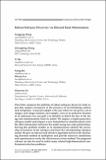| dc.contributor.author | Wang, Xinggang | |
| dc.contributor.author | Zhang, Zhengdong | |
| dc.contributor.author | Ma, Yi | |
| dc.contributor.author | Bai, Xiang | |
| dc.contributor.author | Liu, Wenyu | |
| dc.contributor.author | Tu, Zhuowen | |
| dc.date.accessioned | 2014-05-30T16:07:35Z | |
| dc.date.available | 2014-05-30T16:07:35Z | |
| dc.date.issued | 2014-02 | |
| dc.date.submitted | 2013-03 | |
| dc.identifier.issn | 0899-7667 | |
| dc.identifier.issn | 1530-888X | |
| dc.identifier.uri | http://hdl.handle.net/1721.1/87586 | |
| dc.description.abstract | This letter examines the problem of robust subspace discovery from input data samples (instances) in the presence of overwhelming outliers and corruptions. A typical example is the case where we are given a set of images; each image contains, for example, a face at an unknown location of an unknown size; our goal is to identify or detect the face in the image and simultaneously learn its model. We employ a simple generative subspace model and propose a new formulation to simultaneously infer the label information and learn the model using low-rank optimization. Solving this problem enables us to simultaneously identify the ownership of instances to the subspace and learn the corresponding subspace model. We give an efficient and effective algorithm based on the alternating direction method of multipliers and provide extensive simulations and experiments to verify the effectiveness of our method. The proposed scheme can also be used to tackle many related high-dimensional combinatorial selection problems. | en_US |
| dc.description.sponsorship | National Science Foundation (U.S.) (IIS-1216528) | en_US |
| dc.description.sponsorship | National Science Foundation (U.S.) (IIS-1360566) | en_US |
| dc.description.sponsorship | National Science Foundation (U.S.) (CAREER Award IIS-0844566) | en_US |
| dc.description.sponsorship | National Science Foundation (U.S.) (CAREER Award IIS-1360568) | en_US |
| dc.language.iso | en_US | |
| dc.publisher | MIT Press | en_US |
| dc.relation.isversionof | http://dx.doi.org/10.1162/NECO_a_00555 | en_US |
| dc.rights | Article is made available in accordance with the publisher's policy and may be subject to US copyright law. Please refer to the publisher's site for terms of use. | en_US |
| dc.source | MIT Press | en_US |
| dc.title | Robust Subspace Discovery via Relaxed Rank Minimization | en_US |
| dc.type | Article | en_US |
| dc.identifier.citation | Wang, Xinggang, Zhengdong Zhang, Yi Ma, Xiang Bai, Wenyu Liu, and Zhuowen Tu. “Robust Subspace Discovery via Relaxed Rank Minimization.” Neural Computation 26, no. 3 (March 2014): 611–635. © 2014 Massachusetts Institute of Technology | en_US |
| dc.contributor.department | Massachusetts Institute of Technology. Department of Electrical Engineering and Computer Science | en_US |
| dc.contributor.mitauthor | Zhang, Zhengdong | en_US |
| dc.relation.journal | Neural Computation | en_US |
| dc.eprint.version | Final published version | en_US |
| dc.type.uri | http://purl.org/eprint/type/JournalArticle | en_US |
| eprint.status | http://purl.org/eprint/status/PeerReviewed | en_US |
| dspace.orderedauthors | Wang, Xinggang; Zhang, Zhengdong; Ma, Yi; Bai, Xiang; Liu, Wenyu; Tu, Zhuowen | en_US |
| dc.identifier.orcid | https://orcid.org/0000-0002-0619-8199 | |
| mit.license | PUBLISHER_POLICY | en_US |
| mit.metadata.status | Complete | |

